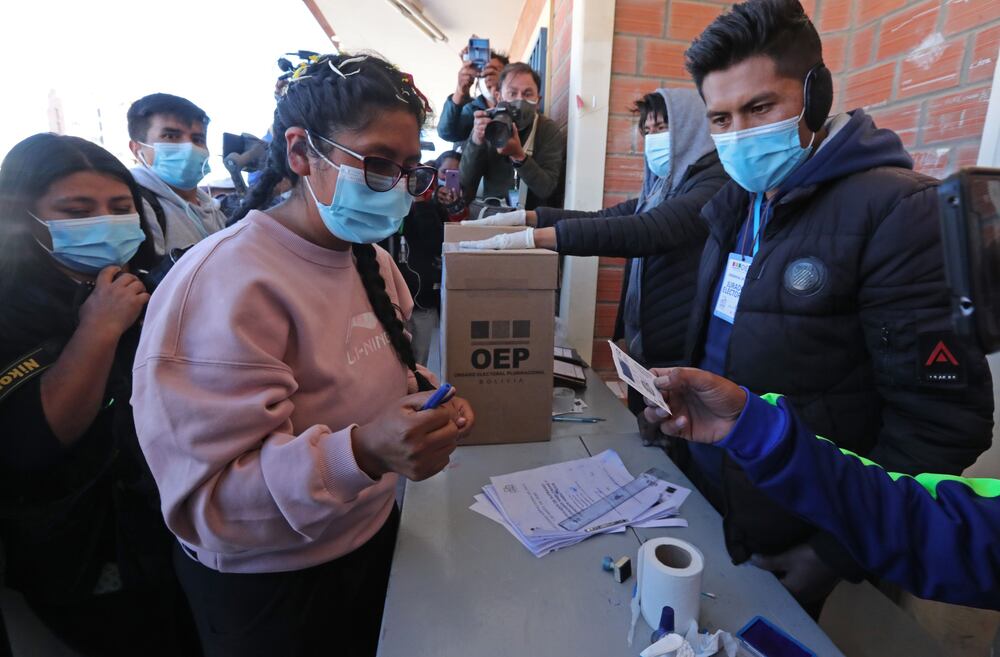Around 5.5 million Bolivians went to the polls this Sunday to renew mayors and governors in the first elections since the presidential elections in October, when Evo Morales' Movement for Socialism (MAS) returned to power.
The results of the quick count, carried out by a private pollster, draw a mixed horizon.
On the one hand, the MAS conquers between five and seven of the nine governorates –and probably most of the rural municipalities–, but most of the main Bolivian cities will be administered during the next five years by opposition leaders.
In addition, the worst enemy of the leftist party, the ultra-conservative Luis Fernando Camacho - leader of the protests that ended in the overthrow of Morales at the end of 2019 - will rule Santa Cruz, the most conservative and wealthiest region in the country.
For the first time in the history of Bolivia, in April there will be second electoral rounds in several regions in which the candidates have not achieved clear victories.
It will not be the case of Santa Cruz, since in it Camacho has obtained more than 50% of the votes.
Evo Morales was a sure winner in seven governorships, as was his goal as MAS campaign manager.
“The vote for us is not only for the candidates, but for our economic policies and social programs.
We have created the MAS to support the most humble, the poor Bolivians ”, declared the former president on the night of the elections.
A recent dissident from MAS, Eva Copa, won the mayoralty in the urban stronghold of the ruling party, the Aymara immigrant city of El Alto, which borders the capital La Paz.
Copa was a member of the MAS until a little before the start of the campaign, but broke with him for not having been designated as a candidate to lead the municipal government of this city.
Competing with the Jallala group, he achieved an electoral record: he obtained 67% of the votes and nine to ten councilors out of a total of 11, amply proving that the socialist leadership made a mistake by not taking it into account.
The new mayor of La Paz will be Iván Arias, a former minister of the interim government of Jeanine Áñez.
The former president also competed in this race, running for Governor of her native region, Beni, located in the eastern part of the country.
It was bad for him.
He was in third place, behind two other candidates, one of them official.
With these results, the opposition to the MAS has been almost completely reconfigured.
The old figures and organizations that led the political struggle against Morales' successive administrations, in particular against his desire to be re-elected, have practically disappeared, and have been replaced by new leaders who emerged from the political crisis that Bolivia experienced last year, although there are also some, like the incoming mayor of Cochabamba Manfred Reyes Villa, who come from a more remote political past.
These are more conservative and religious leaders, who some analysts describe as "right-wing populists."
The party of former president Carlos Mesa, who came second after Luis Arce in the last presidential elections, maintains some positions;
Possibly he will win the mayor's office of Santa Cruz de la Sierra, although the difference between his candidate and the second is very small and it is necessary to wait for the official results.
Election day was full of organizational problems, as had not happened in a long time.
An undetermined but significant number of electoral juries did not appear in the morning to open the polling stations, so the start of the vote was postponed and long lines formed that did not respect the biosafety measures established by the Electoral Tribunal.
Despite this, the president of this electoral institution, Salvador Romero, stressed that the electoral day was “peaceful, calm, calm and also highly participatory.
This is an element that favors Bolivian democracy ”.
There was only one incident in a small town in Santa Cruz, where a group of people burned 14 urns.
Romero has also been criticized for failing to set up a system to publish quick preliminary results.
Because of this, the official figures of the election will only be known in the next seven days.
The Electoral Tribunal explained that it did not want to introduce a counting mechanism that was not entirely reliable and that, then, would create confusion and mistrust.

